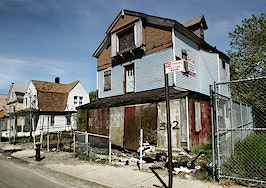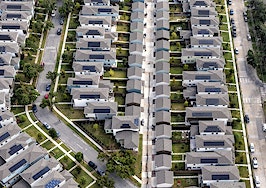Nationwide delinquency rates are still at record lows, but that could very soon change as the coronavirus outbreak continues to uproot the job market and economy.
In January, only 3.5 percent of homes were in some state of delinquency, according to new data from property analytics provider CoreLogic. The numbers reflect pre-pandemic period of prosperity and upward growth — rates are down 0.2 percent from December and 0.5 percent from last year. The number of people falling behind on their mortgage payments has been falling consistently for over two years while foreclosures, a situation in which one’s home is seized due to inability to pay, have also remained at an all-time low of 0.4 percent.

CoreLogic
“Home loan delinquency and foreclosure rates were the lowest in a generation before the COVID-19 pandemic hit,” Dr. Frank Nothaft, chief economist at CoreLogic, said in a prepared statement. “Recession-induced job losses will fuel delinquencies. However, wide-spread foreclosures across America will likely be averted because of the home equity buffer that homeowners have and the available forbearance programs.”
That said, such a long streak of good news could very soon be offset by the coronavirus outbreak. As non-essential businesses remain shut and people stay unemployed for long stretches of time, people will inevitably struggle to make their mortgage payments. Short-term government anti-deferral and stimulus programs may help weather the immediate impact, but if the pandemic drags on, those who stay unemployed for long stretches of time will start to struggle financially in the long term.
CoreLogic predicts that parts of the country whose economies rely heavily on the energy, transportation, media and entertainment industries will be some of the first to see increased delinquency numbers. Rather than coming all at once in a given month, delinquencies and eventually foreclosures are expected to start climbing throughout the entire year.

CoreLogic
“After some initial cushioning from equity buffers, lower mortgage interest costs and government support and forbearance programs, we expect delinquency rates to jump significantly throughout the year as the economic toll from COVID-19 becomes more evident,” Frank Martell, president and CEO of CoreLogic, said in a prepared statement. “[…] The ultimate extent of the higher delinquencies will depend on how quickly the broader economy opens up again and employment levels rebound – both of these factors are uncertain at this time.”












